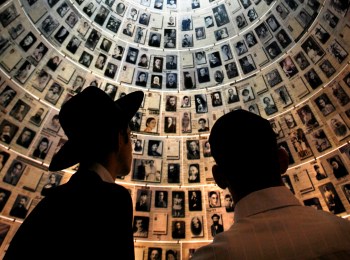| | 20 April, 2009
| | If Not for the Holocaust, There could have been 32 Million Jews in the World Today | | Says Hebrew University scholar |
 | | The Jewish people has not yet succeeded in restoring even half of the losses (photo by Flash90) |
|
If it were not for the Holocaust, the number of Jews in the world would likely today be at least 26 million, and perhaps even as much as 32 million, says Prof. Sergio DellaPergola of the Hebrew University of Jerusalem.
DellaPergola, a world renowned figure in Jewish demography, is Shlomo Argov Professor of Israel-Diaspora Relations and director of the Division of Jewish Demography and Statistics at the Avraham Harman Institute of Contemporary Jewry at the Hebrew University.
“The Holocaust struck a deep blow to the demographic, cultural and social fabric of the Jewish people in many ways and with long-range consequences,” says DellaPergola. In 1939 there were 16½ million Jews in the world, and in 1945 the number was estimated at 11 million, he said. . In an article to be published soon in the journal “Bishvil Hazikaron” of the International School for Holocaust Studies at Yad Vashem in Jerusalem, Prof. DellaPergola provides his analyses of the demographic damage to the Jewish people resulting from the Holocaust.
He points to several long-term consequences that occurred during that period: First, the destruction of cultural frameworks, an element which prevented Jews from marrying and having children over an extended period. Second, a rise in intermarriages, seen as a relatively safe way of escaping the oppressors. Third, the number of male victims outnumbering the female ones, leading to lower fertility and also in some cases to intermarriage. Fourth, the murder of so many children in a population which had a high proportion of young people.
Prof. DellaPergola presents two main models to provide an estimated current demographic makeup of the Jewish people if the Holocaust had not occurred. In one, the less optimistic picture, the socioecomonic situation of the Jews is seen as having made little progress in Eastern Europe, with a low birth rate and high intermarrriage. This would have given us a total number of Jews in the world today of 26 million. In the other model, DellaPergola estimates that had the situation of the Eastern European Jews been better in terms of economic progress, lower intermarriage and a higher birth rate, then the number world-wide would today have reached 32 million.
DellaPergola notes that more than 60 years after the end of the Holocaust, the Jewish people has not succeeded in restoring even half of the losses to its numbers in absolute terms. Further, he says, the Jewish population today is significantly older and less fertile than it was before the Holocaust.
Prof. DellaPergola estimates at one million the number of those Jews who were in one way or another in danger during the Second World War and survived until today. Of those, some 300,000 suffered under conditions of torture and degradation, he says.
|
Downloadable File: SergioEn.doc |
|


